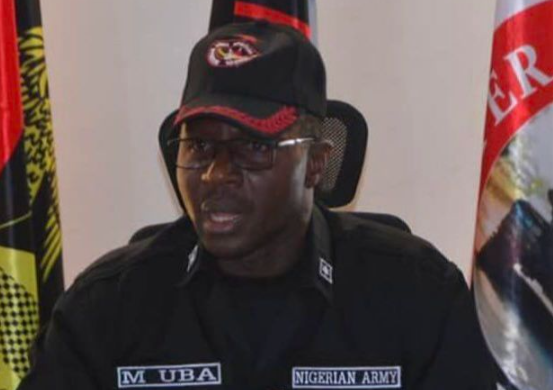Uba
The abduction and killing of Brigadier-General Musa Uba, Commander, 25 Task Force Brigade in Damboa, Borno State, is an affront to the “Queen of Battles.” Ambushes are common in warfare. Looking intently at the image of the senior officer, I didn’t see fear even in the face of death. Fear is not an attribute of a soldier. He died fighting for what he believed in. The unity of Nigeria. Those in haste to condemn the military when it suffers casualties should be circumspect. The military that I know won’t stay idle when the life of any of its personnel is in danger. It is not military culture. You can take this to the bank. But I have some concerns regarding what happened at the operation.
As the Brigade Commander of the 25 Task Force Brigade in Damboa, his area of responsibility encompasses Bulabili, Askira Uba, and other adjoining towns. That triangle is a notorious one in the Boko Haram insurgency. It links Southern Borno to Northern Borno. Askira Uba indeed borders Cameroon. Whoever controls that route is advantaged. In an offensive, once the military is under attack, the soldiers must form a defensive perimeter around their commander, usually referred to as the “eagle.” In this case, the 25 Task Force Brigade has four battalions under its control. The closest to the spot was the 81 Battalion stationed in Bulabili town, which is less than four kilometers away. There is also the “A” company located in Daluwa, which serves as a “blocking force” for the 192 Battalion in Daluwa, another adjoining town. And the 192 Battalion is collocated with the 26 Task Force Brigade Headquarters in Gwoza. If this were the case, why did it take so long for the commander to be rescued?
Other questions are whether the senior officer was with his men at the time of the ambush, and if so, how did separation occur so easily? Again, was that operation connected to logistics, weapons transport, or an unpublicized operation? Was there a pre-arranged air and ground backup plan before the movement began, considering the volatility of the area? I have many more questions to ask. But I will leave them for another day because I am aware that military operations are complex and far beyond what we can imagine. Yes, there might be a few operational lapses. It is common in warfare.
Fog of war
Advertisement
In warfare, several factors come into play. Issues get complicated in unusual situations. That is what makes it asymmetric. Sun Tzu, the renowned Chinese military strategist, in chapter 11 of his work, “The Art of War,” highlights the profound significance of “terrain” in shaping battle outcomes. He states that each landscape presents unique challenges and opportunities for commanders seeking victory on the battlefield. He describes various kinds of terrains in warfare. These include accessible ground, entangling ground, temporizing ground, narrow passes, precipitous heights, and positions at a great distance from the enemy.
In war situations, things do not appear as they seem most of the time. What we get to see or hear are outcomes. And it is dangerous as a non-participant in the war to judge or draw conclusions. Based on the postulations of Sun Tzu in his analysis of “terrains” in warfare, “ground which can be abandoned but is hard to re-occupy is called entangling”. He posits that “entangling ground” demands a delicate balance of aggression and prudence. “While the potential for surprise attacks exists, commanders must weigh the risks carefully and ensure adequate preparation before committing to offensive actions.” This explains my earlier question about whether there was a pre-arranged air and ground backup plan before the movement began.
ISWAP terrorists are impatient. Sun Tzu’s work highlights this much in his concept of the “Temporizing ground.” Temporizing ground presents a scenario where neither side stands to gain from initiating action. He advises that commanders should “exercise restraint in such situations, and make a strategic withdrawal to entice the enemy into exposing their vulnerabilities.” He sums it up by analyzing that “the key to success on the temporizing ground lies in leveraging the enemy’s impatience and capitalizing on their eagerness to provoke a response.”
Advertisement
Conventional and unconventional wars are miles apart.
What we experience in the northeast is asymmetric warfare. It is unconventional. It goes against the rules of engagement in warfare as we know them. It is more like fighting your shadows. It is important to know this. The military is stretched beyond imagination and bloodied. I was privileged to have insights into military operations in the northeast. It was shivering. For example, I visited Baga in 2018 when I researched the socioeconomic impact of the Boko Haram Insurgency in the Kukawa local government area of Borno State. Emotions betrayed me. The outcome of that research is captured in my soon-to-be-published book titled “Kukawa: From Ancient Empire to Modern Insurgency.”
The queen of battles remains resolute.
Let’s avoid the conversation on how non-state actors got sophisticated militarily. It is a topic for another day. The conspiracies and external alliances with other insurgent groups can’t be ruled out. The call for regional cooperation to address this threat has been prominent. The former Chief of Defence Staff, General Christopher Musa, was an advocate. But I do not think much has been achieved in this regard. It is crucial though. The insurgents are no longer a ragtag group. They operate like a parallel force with chains of command and unhindered access to arms and ammunition, including high-caliber weapons. They are experts in setting booby traps and carrying out ambushes. Their sense of coordination during attacks is audacious. But in all of these, the “Queen of Battles” stands resolute. Otherwise, there would have been no country called Nigeria. This is food for thought.
Advertisement
Those who have paid the ultimate price are forever in our hearts. Life in the trenches is deadly and unpredictable. There are several mind-boggling instances. For example, a friend deployed in the trenches in the northeast told me of a story of a young boy who ran errands for soldiers at their base. And there was a day, the insurgents attempted to overrun their base but met their waterloo. Surprisingly, the young boy was among the casualties, and with rounds of ammunition glued to his body like a magnet. The shock was palpable. Who would have suspected that the young boy was a member of the insurgent group? This is an example of what life is like for the military in the northeast. You can’t be too careful or too strategic. In warfare, victory is from God alone. (Nasrunminallah). This is the motto of the “Queen of Battles.”
Ocheja, PhD, is a military historian and an alumnus of the Nigerian Defence Academy.
Views expressed by contributors are strictly personal and not of TheCable.


